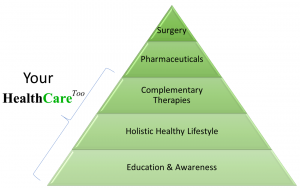Lifestyle Diseases Need Lifestyle Medicine

Medical specialists have known for decades that up to 80% of conditions that cause premature deaths and disease can be prevented or even reversed by relatively simple interventions.
One has only to sit on a bench in a shopping mall, or under a beach umbrella and observe the mass of humanity around to realise there is a disaster brewing in South Africa, as well as most of the Western world – a disaster in terms of complications of diabetes, heart disease, arthritis, obesity and cancer.
And yet, medical specialists have known for decades that up to 80% of conditions that cause premature deaths and disease can be prevented or even reversed by relatively simple interventions.
Imagine if you saw a headline on CNN or BBC that a new medicine had been discovered that could prevent or reverse diabetes, and at the same time, prevent and reverse the progression of heart disease, reduce weight, reduce painful joints associated with arthritis and significantly reduce the incidence of common cancers.
On top of that those that used it would feel full of energy and vitality, and prolong life by up to 10 years – not just surviving, but really living. In spite of all these amazing benefits, there were very few side effects – in fact it was safe for children as well as octogenarians, and could even be used by those with advanced heart disease and renal failure. Would you not be one of the first to rush down to the chemist to order this medicine?
Well the good news is there is such a therapy – but it is not found in the pharmacy, but rather in the supermarket or fresh produce store; together with places where enjoyable exercise is practised, and even in your home where loving support from family is obtained.
Generally, these interventions are not often mentioned by your doctor, because doctors have not been trained in lifestyle medicine, and doctors are generally too busy to take time to discuss your diet or exercise regime or sleep patterns, or your addictive behaviours.
This is where lifestyle medicine comes into play. In various countries around the world, the speciality of Lifestyle Medicine has become established – as much of a specialty as internal medicine, orthopaedics, paediatrics or cardio-thoracic surgery.
Often there are dramatic results of these interventions – angina symptoms abate within weeks; insulin requirements fall within days; arthritic pains subside within a few days; mass and size diminish progressively; general well-being and sleep patterns improve dramatically within months.
Source: Turning the Tide on Lifestyle Diseases – It’s time to change our approach | South Coast Herald
Our Model




